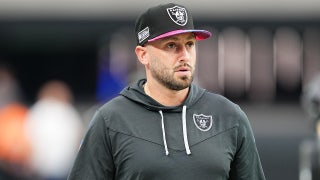BUFFALO, N.Y. – Russian captain Vladimir Tarasenko didn't have to wait for an interpreter to describe his team's final thrilling comeback victory.
"We're champions! We're champions! Waaa-hooo!" Tarasenko yelled, wiping tears from his eyes and never taking a hand off the gold medal that hung from his neck.
Tarasenko had a goal and assist and Russia scored five goals in the third period to overcome a 3-0 deficit and stun Canada 5-3 in the gold-medal game in the World Junior Hockey Championships on Wednesday night.
It was the third straight game the Russians rallied in the third period, and the improbable win secured their 13th title and first since 2003.
"It was the Russian heart and the Russian character," added Yevgeni Kuznetsov, who had three assists. "This is the best team in the world right now."
Wow Russia. Woe, Canada.
Artemi Panarin scored twice, including the go-ahead goal with 4:38 left as the Russians scored five times on 10 shots and in a span of 16:11. The outburst silenced the heavily pro-Canadian crowd that packed HSBC Arena and headed for the exits after Nikita Dvurechenski scored with 1:16 left.
"It's our fault," Canadian captain Ryan Ellis said. "We had the game in our hands and we let it slip."
Brayden Schenn had a goal and an assist, and Ellis and Carter Ashton also scored for Canada, which lost the title game for the second straight time after losing to the United States 6-5 in overtime last year.
And there was no consolation in silver, which gave the Canadians an even split of five silvers and five golds over the past 10 years.
"We didn't come here to get silver. We came to get gold. And it's a brutal feeling," said goalie Mark Visentin, who stopped 22 shots. "Explain it? Well, it was pretty straightforward: We got scored on and I should've made a couple of more saves."
Earlier, Chris Kreider scored twice, leading the United States to a 4-2 win over Sweden in the bronze-medal game. After winning gold last year, the Americans won medals in consecutive tournaments for the first time, and also won their first medal in five times hosting the event.
The Russian comeback seemed unlikely after Canada controlled the first two periods. The Canadians held the edge in shots through two periods, 29-17, and had a 3-0 lead when Schenn scored at the 13:33 mark to chase Russian starter Dmitri Shikin.
Igor Bobkov took over to stop all 20 shots he faced in his first appearance since a 6-3 tournament-opening loss to these same Canadians.
Back came the Russians.
Panarin and Maxim Kitsyn scored 13 second apart to cut Canada's lead to 3-2 at the 2:46 mark of the third period. Tarasenko tied it 4:33 later by one-timing a shot from the right circle. He was set up by Yevgeni Kuznetsov, who circled the net and then made a nifty blind pass through the middle, catching the Canadians sleeping.
Panarin's second goal put the Russians ahead for good with 4:38 left. With Canada bottled up in its own zone, Tarasenko circled the net and fed the puck in front, where Panarin squeezed a shot through Visentin's legs.
Once the final horn sounded, the Russian players stormed off the bench to mob Bobkov. Then a number of players came together, lifting coach Valeri Bragin on their shoulders and tossing him in the air.
Tarasenko motioned to the crowd during the celebration after several beer cans were thrown at the Russians from the stands.
"Obviously, it's the best moment in my career so far," Panarin said. "We simply believed in ourselves."
They were coming off a 4-3 shootout win over Sweden, in which Sergei Kalinin forced the tie by scoring with 1:27 left. Then there was their 4-3 overtime win over Finland in the quarterfinal Sunday, in which Russia scored twice in the final 4 minutes of regulation to overcome a 3-1 deficit.
"I never give up," coach Bragin said. "I told my players we need to score just one goal then Canada becomes more nervous. I was confident in my guys."
Russia ended a five-game losing streak to the Canadians, a stretch that included three losses in gold medal games.
"Five goals in the third period of a gold-medal game, you can't explain it," said Schenn. "There's a lot of disbelief."
Schenn passed some significant names on the nation's single-tournament scoring list by finishing with 18 points. That tied the Canadian junior record set by Dale McCourt in 1977, and was one more than both Wayne Gretzky (1978) and Eric Lindros (1991).
NOTES: Tournament organizers project the 11-day event will finish with an overall attendance figure of more than 330,000, which would make it the second-most attended junior tournament behind Ottawa, which drew 453,282 in 2009. More than 60 percent of the tickets sold went to Canadian fans as Buffalo is a 90-minute drive from Toronto. ... USA Hockey executive director Dave Ogrean anticipated the large Canadian turnout, and indicated future tournaments in the U.S. will be awarded to cities close to Canada. The U.S. is next set to host the World Juniors in 2018. ... IIHF President Rene Fasel met with newly elected NHL Players' Association chief Donald Fehr in Buffalo, and was scheduled to have dinner with NHL Commissioner Gary Bettman later. Fasel said he's open making some concessions, but ruled out providing monetary compensation to the NHL in a bid to have NHL players compete in the 2014 Sochi Winter Games. ... USA Hockey spokesman Dave Fischer said 2.8 million ounces of beer were sold before Wednesday.








































